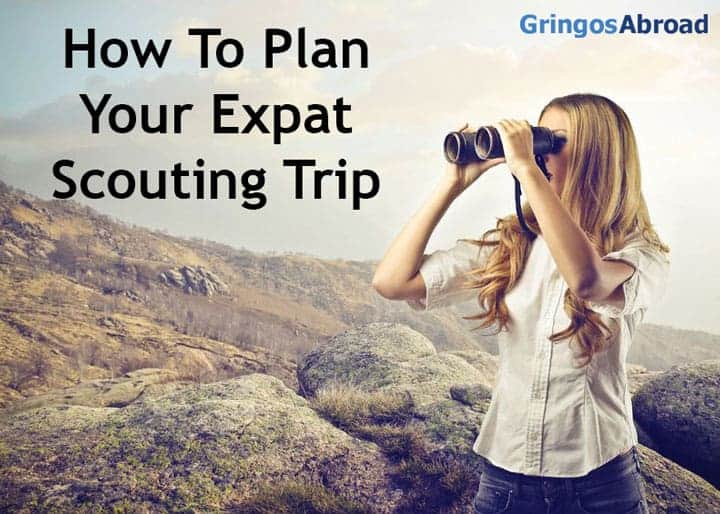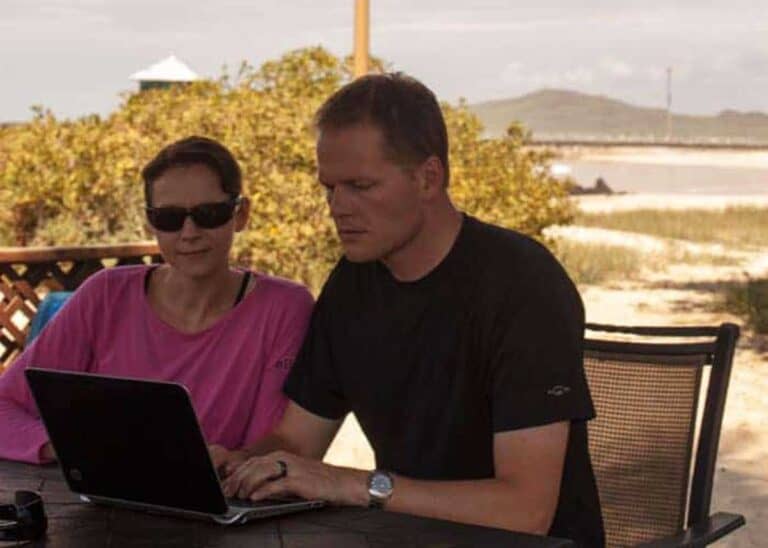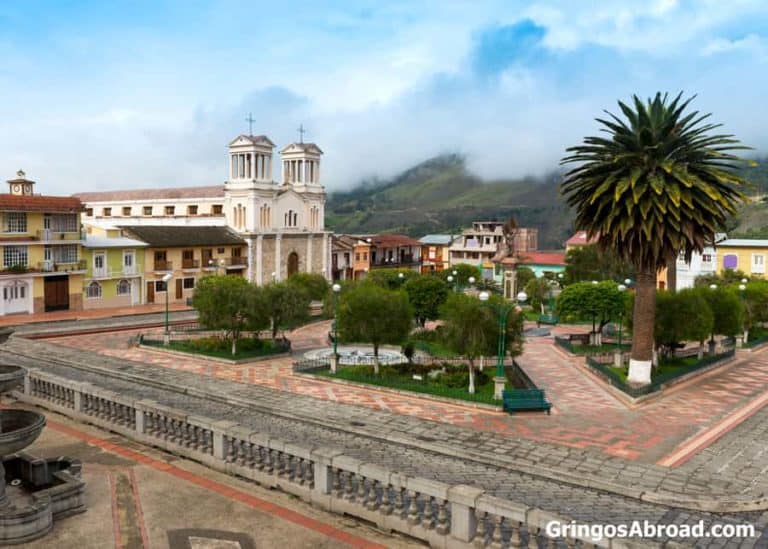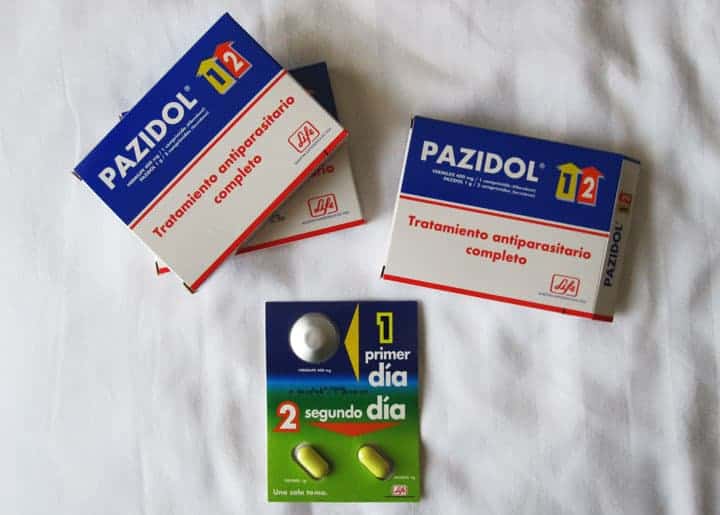16 Things to Do on Your Expat Scouting Trip
Are you planning on taking a scouting trip before you move? Have you traveled internationally? If not, there will be some new things to get used to. We went on a scouting trip to Margarita Island, Venezuela. It paid off. We decided not to move there.
We learned a lot from that trip. The cost of living was too high, there was too much crime, and fresh produce was both limited and expensive. We were also able to compare that against what we were learning about Ecuador.
In the end, we felt comfortable enough with Ecuador that we didn’t make a scouting trip before we moved.

By failing to prepare, you are preparing to fail.– Benjamin Franklin
Here are 16 things you should do and check on during your expat scouting trip. Some of these are specifically for families (like us 🙂 ). But most apply regardless of the size of your family.
16 Things to Check on Your Expat Scouting Trip
- Check housing availability, quality, and costs.
- Speak with a banker about how to handle your money. See what the laws allow for foreigners.
- Speak with an immigration lawyer to confirm what visa you qualify for and what documents you will need when you relocate.
- If you will be moving with your pet, confirm the laws for importation of animals. Ensure that rentals allow pets. Look into local veterinary services.
- Visit the local supermarket and get an idea of food prices, quality and availability.
- Determine what you can’t get in the country. This will help you plan what to bring and what adjustments are necessary.
- Speak with other expats about challenges they face and how they manage. Some things to ask about could include: climate, culture, costs, health and safety, and transportation. If they also have children, ask about schooling, recreation, and language learning.
- Visit local schools and get a feel for the environment and costs. Try to speak with both local and expat parents of kids enrolled there.
- Learn about healthcare quality and costs. Visit a hospital, doctor’s office, and a health insurance provider. Check availability/costs of prescription medications.
- Find things for your kids to do: sports, clubs, culture, and volunteer.
- Learn about the local job market – both for yourself and/or your children in future years. Determine what’s in demand and what skills are needed. Learn about pay and benefit levels.
- Walk a lot. Visit different areas of the city/area during different days of the week and times of day.
- Get to know the locals. Speak to as many as possible to get a true picture of the area and what it’s really like.
- Go shopping at the mall/market. Get an idea of the quality and styles of clothing and footwear. Make sure that you can get your size. Check out the prices of appliances, furniture, and electronics.
- Rent a furnished apartment with a kitchen. This will give you a chance to try local foods and get used to the way locals live. It will be a more realistic experience for your family than hotels and restaurants.
- Try to establish a realistic budget. Learn about power, water, internet, healthcare, schooling, entertainment, clothing, and food expenses.
Your Turn
What would you add? What else should a future expat do on their scouting trip? Or should they even take a scouting trip at all? Please join us in the comments below.








Really good list. One possible addition:
Explore transportation options: In many Latin American cities, you may be able to establish a less car-oriented lifestyle than is possible in most North American locales. Try the buses, the metro, walking and bicycling, the taxis, the ride-hailing. Building a daily life centered around walking will elevate your mental and physical health while helping you live within your budget.
I will be heading to Ecuador in August or September. I plan to make Ecuador my permanent home. I had a short visit in Guyaquil years ago.
1. My concern is first getting from the airport to a reasonable hotel and or rental for a month or so to get some bearings. Is there a real Estate company or individuals which could help me right away in doing this?
2. My preference would be to go straight to a furnished rental for 1-3 months to determine where I’d like to live.
3. Obtaining a Visa prior to going in order to stay at least 6 months. Any tips?
4. Reliable banks to open an account. Will I be able to do this within a week or two?
5. Finding a place either on the ocean or river – on the water makes me happy.
I’d say get a haircut! If you’re going to live abroad for awhile, your hair (and all your grooming needs, for that matter) will be in local hands.
I’ve also found that an experience at the local salon/barber is a good proxy for price/quality of local services, ease in communicating and being understood, etc.
Great article. My wife and I are going to Ecuador for a third and final time to make a decision on where to move (her family lives in San Antonio, Pichincha) and Cuenca seems like its it. My question to you is, Im looking to continue my photo booth business and finally do photography more full time with wildlife, sports, and candids as a wedding 2nd photographer ( I will look into the water dept for jobs since I have 25 years here in Miami), how have you done as a photographer there ? Was the photo booth business flooded there ? Any input would be greatly appreciated……
Thanks,
Mandy
Nice list Bryan. Very comprehensive. I only thought of two things to add.
17) Visit many different neighborhoods in the city AND several different cities to get a well rounded view of the overall area and way of life.
18) Keep an open mind and be creative. The answer to typical expats challenges can be easier solved than some would think.
For instance when I was in Ecuador for 3 month’s last year I lost 50lbs and none of my clothes fit. Being 6’2″ and built like a NFL fullback I could not buy clothes of any shelf in the country. The solution was simple…hire a talented tailor in Cuenca to make me clothes to fit my frame perfectly. I got about 10 items and paid on average $9 for the labor/service per item of clothing plus the cost of the fabric. The solution was much easier for me than ordering something from Amazon.com and hoping it eventually made it through customs.
Great suggestions – thanks Jon. We’ve had great success with tailors in Cuenca as well.
Page does not render properly on S3 with ads at bottom of page overwriting
I’m checking into this. Thanks for the message.
Listed above are all good items to look at, and would, of course,
depend on your situation: having kids or pets, of being single
or not, your age, can you make friends easily, how much money
you have to live on. Having recently returned from Cuenca on
a three month look-see, would perhaps add one most important
item to the list: In short – and in the end, do you see yourself
liking the place – long term. Would hoofing up a few hills at times,
or climbing those eighty four ( I think) steps up from the river,
become a real pain; or being able to continue the smile while
trying to grab onto something within a crowded city bus,
understanding that all bus drivers do not drive the same;
perhaps having to navigate in between plucked naked hens
hanging by their necks in the open markets; why the locals
have not done something about the large number of street
dogs running lose, often turning bags of street garbage into
a waste land of disgusting results; of those excessive, and
lengthy sounding, car alarms going off throughout the city at
all times of day or night; or not being able to communicate
well (or not at all) with the locals – a fact that might, indeed,
become a serious irritant over time … just a few of the situations
one may have to learn to adjust too. As for me, I found Cuenca
to be a great place overall (especially the weather) – even
perhaps for the long haul. As often suggested by others – go
there first, stay for some time. Get to better know the place
– get a good city map, take the long walks in and about town,
grab a good lunch at any one of many great eateries in town.
Pay the quarter bus fare, and take different bus routes in and
around town – an Inexpensive way to see different areas of
the city in a short period of time.
the buses are
or the fact that one has to understand
any thing on wheels may run you over once you step off
the curb; can you take in stride the fact that you may
not be able to communicate with someone at an important
time;
you have too;
Bryan, hope things are getting better physically for the family and enjoying the new-old homestead.:)
I always look forward to your articles. Perhaps types of Transportation and various churches, Christian Faith opportunities in the Quenca area could be added to the list to explore.
Blessings.
Al
Have read and loved your comments on Ecuador. My wife and I recently returned from Ecuador. Now making plans to move. We met some dear friends of yours in Santa Isabel. YHWH
Sam & Karen
Thanks Sam!
1) take Rx to pharmacy, find out availability/costs in Cuenca. Example: Costco in U.S. for 3 mon. $30, Cuenca, w/ Cedula for 3 mon. $120.
2) certain apartment locations cannot get fast internet connectivity. Before selecting new home, find out if TVCable is wired in.
3) return US flight costs from recommended local travel agency for retirees when living in Cuenca.
In following the scouting tips above, it will be pretty much essential to have access to at least some basic Spanish as well as a translator (available on your phone). Limited Spanish combined with the translator and some charades can go a long way to establishing the good will that will facilitate your investigations with the majority of (naturally) Spanish-only speaking citizens. Don’t expect English to be generally available.
It is also helpful to be aware of the Spanish Courtesias as the oil that turns the wheel in Spanish speaking societies that highlight manners.
Also be aware of importation restrictions that prevail for visitors or until you have your Cedula/visa – we have spent about 8 days trying to get a parcel out of customs containing such inoffensive personal items as skin moisturisers, makeup, fibre, essential oils and vitamin B12 which we thought we would order from our usual source in the U.S. rather than carry them in (for our 3 month expat visit until familiar with what was available locally). After numerous calls, emails and a visit, we were informed we were not allowed to import these items as we were not citizens and the parcel returned to the U.S. at a significant cost to us.
Also be aware that there is a prevailing cash only policy and $50 and $100 notes will be considered fake until proven innocent and cannot be changed in many shops. You will be asked to provide your passport number for almost all transactions over $20.
Maybe not as vital for your scouting trip as the tips outlined above but being aware of these might make life a little easier as you go about investigating these tips and exploring your potential new home.
An important list worth sharing. For Thailand, I would add being cautious taking advice from other expats. Because of work permit restrictions, many engage in fraudulent business deals which can catch out foreigners who justifiably think they are dealing with honest individuals. Two expat clubs have been exposed for illegal scams. Be cautious and double check.
Talk to a wide range of Thais and understand that in their culture they will tell you what they think you want to hear. (Grengjai concept in Thai)
A great list which i am happy to share with my Facebook and Twitter followers and on my Blog.
Thanks Matt!